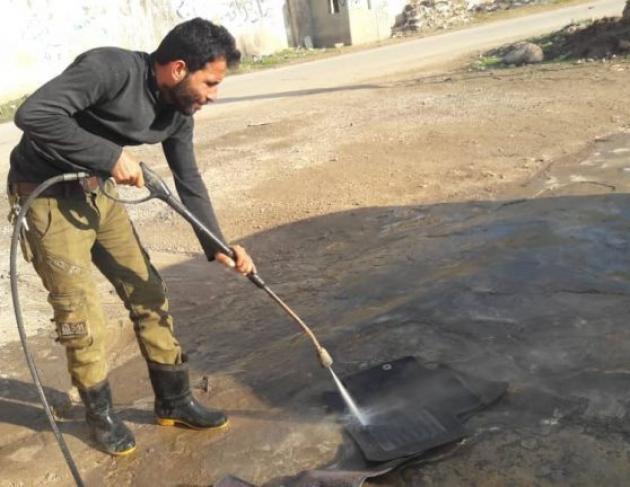Dozens of young men in areas under opposition control in the Hama countryside, who are members of rebel groups, are putting down their weapons and going to work in other professions. This is for a number of reasons, that vary according to the circumstances that followed the Sochi agreement, which was signed between Turkey and Russia, and which set up a demilitarized zone between regime-controlled and opposition-controlled areas.
This phenomenon indicates the spread of the idea that carrying weapons is not the only solution for achieving what Syrians want—especially after the Syrian issue took a turn towards political negotiations and the signing of agreements between the countries which are playing active roles in Syria, such as Russia and Turkey.
Asaad al-Abdullah, a young man from the Hama countryside, told Al-Hal, “About 20 days after the Sochi agreement, I put down my weapons and retired from the group that I was part of and from military actions. I knew that there would be no battles against the regime forces and the militias supporting them—especially given that I joined up believing that the rebel groups would take control of large areas under the control of the regime forces. However, after the agreement and the Turkish role in stopping military action, we became basically guards on bases, and so I left my weapons and now I work at a car wash.”
Mohamed al-Khalid said that one of the most important reasons that he stopped fighting in the ranks of the rebel group was the low monthly salary. “Over the last few months I was getting just 15,000 Syrian pounds (about 30 US dollars), which isn’t enough given that I’m married and I have two children. I decided to leave the group and borrow 1,500 dollars from my relatives and travel to Turkey in search of a livelihood in light of the difficult living conditions.”
For his part, Abdullah al-Hassan, from a village in the northern Hama countryside, said that after the Sochi agreement, “There were no longer any upcoming notable battles against the regime forces. I noticed total calm on the fronts.” He left armed action to return to his studies in Turkey, which he’d left in 2012 because he’d joined one of the rebel groups, and he is now studying to apply for a secondary education certificate.
Views vary in opposition-controlled areas in the Hama countryside about young men laying down arms. Some considered it a good step and the beginning of spreading awareness about stopping fighting and returning to normal life in the area. Others are afraid that if this spreads, regime forces could seize them in a surprise attack.
Ahmed al-Khaleef, a resident of the opposition-controlled Hama countryside, said that, “Dozens of young men laying down arms is evidence of their awareness that the Syrian matter has begun to serve international interests and that rebel groups are no longer the main actors in resolving the issue.” He said that, “Arms will disappear and the people will continue to hope for peace, far from the military actions which have accompanied most of the last seven years.”
Mukhallas al-Hussein had another view, saying, “I’m afraid of the increasing number of men laying down arms, because the regime is not to be trusted, and it could attack and take control of opposition-controlled areas—which would threaten the lives of thousands of civilians.”
Tal al-Saeed, a teacher from the Hama countryside, said that the spread of weapons over the last seven years “had a major negative impact on residents’ lives, as the number of killings and kidnappings increased, and the areas where there are weapons are basically ghost towns. The citizen is in danger as soon as he steps outside his front door.”
Saeed said that men laying down arms was a positive step, through which security could return and stability could be achieved in opposition-controlled areas, especially given that there are a good number of those carrying weapons who are “children not older than 17”. If these people lay down their weapons then they will return to school, which they have been deprived of for years, and those who have families will return to securing their livelihood and going back to a normal life.
This article was translated and edited by The Syrian Observer. Responsibility for the information and views set out in this article lies entirely with the author.


